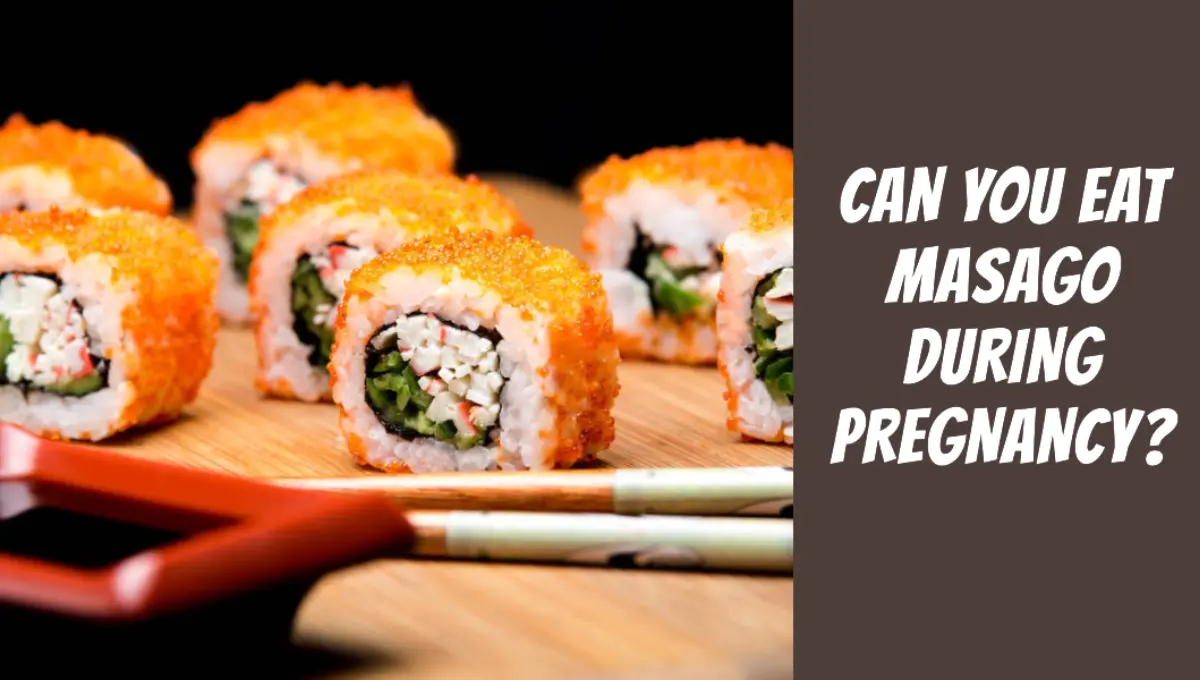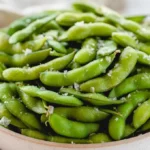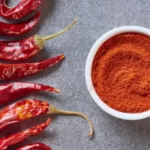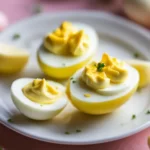
Stepping into the world of pregnancy invites a cascade of advice, dos, and don’ts, especially when it comes to your diet. The question of indulging in masago during pregnancy, for instance, is one that swims in a sea of varied opinions. Masago, those tiny, vibrant eggs from the capelin fish, not only add a pop of color and crunch to our beloved sushi but also bring along a boatload of nutrients like omega-3 fatty acids, protein, and vitamins and minerals. But how does this delicacy fare on the scale of safety and nutrition during pregnancy?
The WebMD gives a nod to its safety in moderation, but let’s dive deeper.
Let’s navigate through the data, dissect the nutritional charts, and explore the empirical evidence to understand the true impact of masago on your pregnancy journey. Together, we’ll sift through the facts, debunk the myths, and perhaps, find a safe harbor in making informed, data-driven decisions about including masago in your pregnancy diet.”
Related: Can You Safely Eat Crawfish While Pregnant?
What is Masago?
Masago is the edible eggs, or roe, of the capelin fish, which is also known as capelin roe or smelt roe. It’s a popular ingredient in some Asian dishes, particularly in sushi. Capelin is a small foraging fish, about the size of a sardine, that frequents cold-water regions, namely the Arctic, North Pacific, and North Atlantic. They are an essential source of food for various ocean predators like whales, puffins, and Atlantic cod. Egg-bearing female capelins are harvested and exported to Asia, where their eggs are extracted and processed to make masago. The eggs are often dyed bright orange, and sometimes red or green, and are known for their briny, slightly fishy flavor and slightly crunchy texture.
Related: Is It Safe To Eat Lox While Pregnant?
What is the Nutritional Value Of Masago?
The nutritional value of Masago (smelt roe) is quite impressive, providing a range of essential nutrients while being low in calories. Below is a table summarizing the nutritional content per 100 grams of Masago:
| Nutrient | Amount | Unit |
|---|---|---|
| Energy | 148 | kcal |
| Protein | 5.22 | g |
| Total Lipid (Fat) | 5.22 | g |
| Carbohydrates | 20 | g |
| Fiber, Total Dietary | 0.9 | g |
| Sugars, Total Including NLEA | 3.48 | g |
| Iron, Fe | 0.31 | g |
| Sodium, Na | 435 | mg |
| Vitamin C, Total Ascorbic Acid | 1 | mg |
| Vitamin A, IU | 0 | IU |
| Fatty Acids, Total Saturated | 0.87 | mg |
| Fatty Acids, Total Trans | 0 | IU |
| Cholesterol | 22 | g |
Can You Eat Masago During Pregnancy?
Yes, you can! Masago is generally considered safe during pregnancy, provided it is pasteurized to eliminate any harmful bacteria. It offers benefits like providing omega-3 fatty acids, which are crucial for fetal brain development. The capelin fish is typically low in mercury compared to larger predatory fish, which is a good sign for expecting mamas. However, it is imperative to source it from reputable suppliers and consume it in moderation due to its high sodium content.
Related: Can You Eat Taramasalata When Pregnant?
what are the Benefits of Eating Masago During Pregnancy?
Eating masago during pregnancy can offer several benefits, particularly due to its nutritional content. Here are some of the potential benefits:
1. Rich in Omega-3 Fatty Acids:
- Brain Development: Omega-3 fatty acids are crucial for the brain development of the fetus.
- Heart Health: These fatty acids can also support heart health and may reduce the risk of heart disease.
2. Low in Calories:
- Weight Management: Masago is relatively low in calories, which can be helpful for managing weight during pregnancy.
3. Protein Source:
- Fetal Development: Protein is vital for the growth and development of the baby’s tissues and organs.
- Mother’s Health: It also supports the mother’s body to grow and sustain the changes during pregnancy.
4. Vitamin B12:
- Energy Production: Vitamin B12 plays a role in energy production, which can be beneficial to manage energy levels during pregnancy.
- Nervous System: It supports the development of the nervous system of the fetus.
5. Minerals:
- Bone Health: Masago contains calcium which is essential for the development of the baby’s bones and teeth.
- Thyroid Function: It also contains iodine, which supports thyroid function and is crucial for the neurological development of the fetus.
6. Antioxidants:
- Cell Protection: Antioxidants in masago can help protect cells from damage by free radicals.
7. Enhanced Flavor Without Added Fats:
- Healthy Eating: Masago can enhance the flavor of dishes without adding unhealthy fats, supporting a balanced diet during pregnancy.
Related: Can You Safely Eat California Rolls While Pregnant?
what are the Risks of Eating Masago During Pregnancy?
While masago can offer several nutritional benefits during pregnancy, there are also potential risks and considerations to keep in mind:
1. High Sodium Content:
- Blood Pressure: The high sodium content in masago can potentially lead to elevated blood pressure, which is a concern during pregnancy.
- Fluid Retention: Excessive sodium can also cause fluid retention, which may exacerbate swelling in the hands and feet during pregnancy.
2. Allergy and Sensitivity:
- Allergic Reactions: Some individuals might be allergic to fish roe, which could trigger allergic reactions.
- Sensitivity: Even without a full-blown allergy, some people might experience sensitivity or intolerance to masago.
3. Bacterial Contamination:
- Foodborne Illness: Raw or improperly handled masago can be a source of bacteria, which can lead to foodborne illnesses that are particularly risky during pregnancy.
- Listeria: Pregnant women are more susceptible to listeria, a bacteria that can be present in unpasteurized foods and can have severe consequences for the fetus.
4. Sustainability and Ethical Concerns:
- Environmental Impact: The harvesting of masago can have a significant impact on capelin populations and, consequently, on the ecosystems in which they live.
- Ethical Considerations: The method of harvesting (targeting egg-bearing females) may also raise ethical concerns.
5. Dietary Additives:
- Artificial Colors: Masago is often dyed to enhance its color, and some individuals might want to avoid artificial colors during pregnancy.
- Preservatives: Depending on the product, masago might contain preservatives or other additives that some might prefer to avoid.
6. Mercury Content:
- Neurological Development: While masago is generally considered low in mercury compared to other seafood, any mercury exposure is a concern during pregnancy due to the potential impact on fetal neurological development.
7. Overconsumption Risks:
- Nutritional Imbalance: While masago is nutritious, relying too heavily on it could lead to an imbalance in the diet, neglecting other vital nutrients.
Related: Can You Eat Kebab During Pregnancy?
Safety Tips and Incorporating Masago in Pregnancy Diet
Incorporating masago into a pregnancy diet can be done safely and nutritiously with some considerations and safety tips:
Safety Tips:
1. Choose Pasteurized Masago:
- Ensure that the masago is pasteurized to eliminate the risk of harmful bacteria that could pose a threat to you and your baby.
2. Watch for Allergies:
- Be mindful of any allergic reactions or sensitivities, especially if you have not consumed masago before.
3. Mind the Sodium:
- Be mindful of the sodium content in masago and try to balance it with other low-sodium foods to manage your overall intake.
4. Quality and Source:
- Purchase masago from reputable sources to ensure it is of high quality and has been stored and handled safely.
5. Avoid Additives:
- Opt for masago with minimal additives, such as artificial colors or preservatives, especially if you are trying to manage your intake of these substances.
6. Consult a Healthcare Professional:
- Always consult with your healthcare provider or a registered dietitian before introducing new foods into your diet during pregnancy.
Incorporating Masago in Pregnancy Diet:
1. In Moderation:
- Include masago in your diet in moderation, considering its high sodium content.
2. Balanced Diet:
- Ensure that masago is part of a balanced diet that includes a variety of nutrients from different food sources.
3. Pairing with Other Foods:
- Pair masago with nutrient-dense foods like vegetables, whole grains, and other protein sources to create balanced meals.
4. Use as a Garnish:
- Use masago as a garnish or a flavor enhancer in dishes, rather than making it the main component of a meal.
5. Incorporate in Various Dishes:
- Add masago to salads, rice dishes, or pasta as a way to enhance flavor and add a nutritional boost without overwhelming the dish.
6. Homemade Sushi:
- If you enjoy sushi, consider making it at home with pasteurized masago and other safe, pregnancy-friendly ingredients.
7. Spreads and Dips:
- You might create spreads or dips with masago, combining it with other ingredients like cream cheese or avocado, to be used in sandwiches or as a dip for vegetables.
8. Avoid Raw Preparations:
- Even though masago is often used in sushi, ensure that any other accompanying ingredients (like fish) are cooked or safe for pregnancy consumption.
Related: Can You Eat Sausage When Pregnant?
What are the Alternatives to Masago During Pregnancy?
If you’re looking for alternatives to masago during pregnancy, whether due to dietary preferences, allergies, or other reasons, here are some options that might be used as substitutes in various dishes:
1. Tobiko (Flying Fish Roe):
- Similar in texture and flavor to masago but slightly larger and crunchier.
- Ensure it is pasteurized if consuming during pregnancy.
2. Avocado:
- Can be used as a substitute in sushi rolls or other dishes where masago is used for its creamy texture.
- Offers healthy fats and is safe during pregnancy.
3. Cooked Shrimp:
- Can be chopped finely and used as a topping or filling in place of masago in various dishes.
- Ensure it is cooked thoroughly to be safe for pregnancy.
4. Salmon Roe (Ikura):
- Larger and has a different texture compared to masago but can be used in similar culinary applications.
- Ensure it is pasteurized for safe consumption during pregnancy.
5. Vegetarian Caviar:
- Made from seaweed, it mimics the texture and appearance of fish roe.
- A plant-based and safe alternative during pregnancy.
6. Chopped Vegetables:
- Finely chopped vegetables like bell peppers or carrots can add color and texture to dishes as a substitute for masago.
- Ensure they are washed thoroughly to avoid any contamination.
7. Quinoa:
- Can be used as a nutritious and textural alternative in some dishes.
- Offers protein and is safe during pregnancy.
8. Cooked or Canned Tuna:
- Can be used in sushi rolls or salads as a substitute for masago.
- Choose varieties that are low in mercury and ensure it is cooked or canned for safety during pregnancy.
9. Sesame Seeds:
- Often used as a garnish in sushi and can provide a nutty flavor and crunchy texture as an alternative to masago.
- Ensure they are toasted if you prefer a crunchier texture.
10. Chickpeas:
- Can be mashed and used in spreads or dips as a substitute for masago.
- Offers protein and fiber and is safe during pregnancy.
11. Egg Yolk:
- Hard-boiled and grated egg yolk can mimic the color and offer a different texture in dishes where masago might be used.
- Ensure it is cooked thoroughly to be safe during pregnancy.
What are some pregnancy-safe recipes that include masago?
Recipe 1: Masago Avocado Rice Bowl
Ingredients:
- 1 cup of cooked rice (preferably sushi rice)
- 3 tablespoons of pasteurized masago
- 1 ripe avocado, sliced
- 1/2 cucumber, thinly sliced
- 1/2 cup of cooked shrimp, peeled and deveined
- 2 tablespoons of low-sodium soy sauce
- 1 teaspoon of sesame oil
- 1 tablespoon of sesame seeds
- 1 tablespoon of chopped green onions for garnish
- Optional: pickled ginger, wasabi, and nori strips
Instructions:
- Prepare the Rice:
- Cook the sushi rice according to package instructions and let it cool slightly.
- Assemble the Bowl:
- Place the cooked rice as the base in a serving bowl.
- Neatly arrange the sliced avocado, cucumber, and cooked shrimp on top of the rice.
- Add the Masago:
- Gently spoon the pasteurized masago over the arranged ingredients in the bowl.
- Season and Garnish:
- Drizzle the low-sodium soy sauce and sesame oil over the bowl.
- Sprinkle sesame seeds and chopped green onions for added flavor and a pop of color.
- Optionally, serve with pickled ginger, wasabi, and nori strips on the side.
- Serve and Enjoy:
- Gently mix the ingredients together to enjoy a blend of flavors in every bite.
Recipe 2: Creamy Masago Pasta Salad
Ingredients:
- 2 cups of cooked pasta (your choice of type)
- 3 tablespoons of pasteurized masago
- 1/2 cup of cooked peas
- 1/2 cup of diced cooked carrots
- 1/4 cup of mayonnaise
- 1 tablespoon of lemon juice
- Salt and pepper to taste
- 2 tablespoons of chopped fresh parsley
- 1/2 teaspoon of garlic powder
- Optional: grated parmesan cheese
Instructions:
- Cook the Pasta:
- Boil the pasta according to package instructions until al dente, then drain and let it cool.
- Prepare the Vegetables:
- Ensure peas and carrots are cooked and cooled. You may use frozen peas and carrots, just ensure they are thawed and drained.
- Create the Dressing:
- In a small bowl, mix together mayonnaise, lemon juice, garlic powder, salt, and pepper to create a creamy dressing.
- Assemble the Salad:
- In a large mixing bowl, combine the cooled pasta, peas, and carrots.
- Add the dressing to the pasta and vegetables, mixing well to coat everything evenly.
- Add the Masago:
- Gently fold in the pasteurized masago, ensuring it is distributed throughout the salad.
- Garnish and Serve:
- Sprinkle chopped fresh parsley over the salad for a burst of freshness.
- Optionally, garnish with grated parmesan cheese for an extra layer of flavor.
- Chill the salad for at least 30 minutes before serving to allow the flavors to meld together.
- Serve chilled and enjoy your creamy masago pasta salad!
Note: Always ensure that the masago is pasteurized and other ingredients are pregnancy-safe. Adjust the seasoning as per your taste and dietary requirements during pregnancy. If you have any more questions or need further variations, feel free to ask!
Related: Can You Eat Aioli During Pregnancy?
Conclusion
Navigating through the dietary choices during pregnancy, especially when it comes to delicacies like masago, requires a blend of caution and knowledge. Masago, with its vibrant color and unique texture, brings not only a culinary delight but also a host of nutrients like omega-3 fatty acids, protein, vitamins and minerals pivotal for the developing fetus. However, the journey doesn’t come without its hurdles – the high sodium content and potential risks associated with raw seafood consumption necessitate mindful indulgence.
Ensuring the masago is pasteurized, keeping a vigilant eye on portion sizes to manage sodium intake, and being mindful of any allergic reactions are paramount for a safe culinary experience during pregnancy. Alternatives like avocado or vegetarian caviar stand ready for those who prefer to sidestep these considerations, providing varied options to explore different flavors and textures.
Embarking on this gastronomic adventure during pregnancy should always be accompanied by consultation with healthcare professionals, ensuring that the path chosen is safe and nutritious for both mother and baby. May your pregnancy journey be filled with delightful and safe dining experiences!
Feel free to revisit any section for a refresher on safely enjoying masago during pregnancy, and remember: moderation, safety, and enjoyment can harmoniously coexist on your plate.
Related: Is It Safe To Eat Paprika During Pregnancy
Frequently Asked Questions (FAQs)
Is it safe to consume masago during pregnancy?
Yes, masago can be safe during pregnancy if it is pasteurized to eliminate harmful bacteria, but always consult with a healthcare provider first.
What are the nutritional benefits of masago for pregnant women?
Masago is rich in omega-3 fatty acids, beneficial for fetal brain development, and also provides protein, vitamin B12, and other essential nutrients.
Are there any risks associated with eating masago while pregnant?
Risks may include high sodium content and potential allergic reactions. Ensure masago is pasteurized and consume in moderation to manage sodium intake.
How can I safely incorporate masago into my diet during pregnancy?
Choose pasteurized masago, consume it in moderation, and pair it with other nutritious foods to ensure a balanced diet while considering its high sodium content.
Are there alternatives to masago for pregnant women who want to avoid it?
Yes, alternatives like avocado, cooked shrimp, or vegetarian caviar can be used as substitutes in various dishes, offering different textures and flavors.












